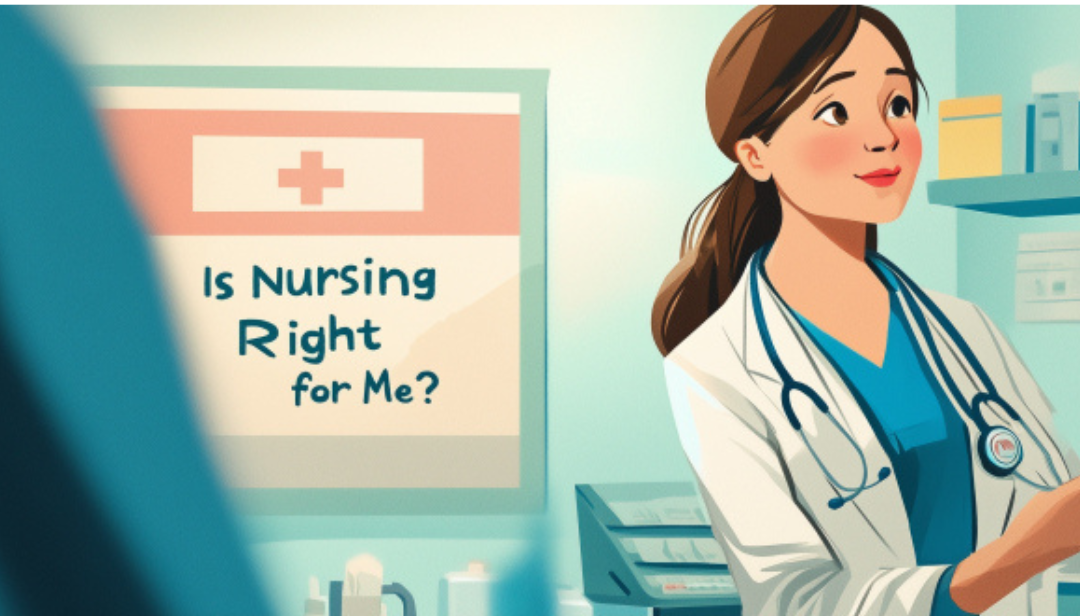Nursing Pros and Cons: How Do I Know If Being a Nurse is Right For Me?
As outlined in the Occupational Outlook Handbook, the employment rate for registered nurses is expected to grow significantly in the coming years. If you’re interested in joining this growth by choosing a nursing career, this article will help you determine whether this is the right career fit for you.


Back
8 mins read
Choosing the right career requires careful consideration of one's interests, skills, and aspirations. Becoming a nurse is a fruitful and rewarding experience, but it is a big decision that shouldn't be rushed into.
Nursing careers are available to everyone if you're willing to work hard, both in class and on the job. However, being smart and working hard are not the only qualifications for being a nurse.
Aspiring nurses must reflect on their passion for helping others, their ability to handle challenging situations with empathy and resilience, and their commitment to lifelong learning and growth within the dynamic healthcare field.
Please note, this is not a practical "how to be a nurse" type of article, but rather something to help you answer more personal questions such as:
- Am I smart enough for nursing?
- Do I have the right personality traits for nursing jobs?
- Do I have the qualifications to be a nurse?
- And most importantly, should I become a nurse?
While the answers to these questions will vary from person to person, before spending years studying to become a nurse or potentially ending up unhappy in a job that's not a good fit for you, there are things to consider besides the academic training.
Knowing the pros and cons of a nursing career, the personality traits needed for nursing, and the qualifications required to become a nurse can provide valuable insights into whether this career path aligns with your values, strengths, and career goals.
This guide will give you that information to help you make an informed decision about whether being a nurse is right for you.
Pros and Cons of Nursing: Is a Nursing Career for You?

The nursing profession offers many benefits but also comes with challenges. When planning your career, due diligence is important, and this includes understanding both the advantages and disadvantages of any given profession.
Here are some nursing pros and cons you should be aware of.
Reasons to Become a Nurse: The Pros
Nursing is a profoundly impactful and rewarding profession, offering numerous benefits to those who enter its ranks. This section explores the various advantages of a career in nursing, from the personal satisfaction derived from caring for others to the practical benefits of job security and flexibility.
Nurses Make a Difference
If you love helping others, nursing will help you make a difference in other people's lives. Nurses have a unique opportunity to directly impact people's lives by assisting them to overcome mental, physical, and psychological problems.
Whether administering medication, assisting with daily activities, providing care, or offering emotional support, nurses are crucial in improving patients' health outcomes and general quality of life. The good thing is that you'll see the effects of your daily hard work on your clients when they smile and appreciate the attention you give them.
Nurses Have Growth Opportunities
Nursing is your best bet if you're looking for a career where you can grow. Some of the growth opportunities in nursing include:
- Becoming a nurse educator
- Being an administrator in a healthcare facility
- Becoming a nurse leader or manager
- Growing to an advanced practice nurse, for instance, being a nurse midwife or nurse practitioner
- Earning specialty certifications
- Becoming a mental health nurse
- Becoming a telehealth or remote nurse
- Becoming a public health nurse
Nurses Make a Comfortable Living
Even though salary shouldn't be the most important factor in deciding which career path to take, it is still one of the reasons people quit their jobs. You'll be happy to know that nurses make good money. As per the Bureau of Labor Statistics, the median salary of a registered nurse as of 2022 was $81,220 per year.
Nursing also offers various career paths and specializations, each with its salary potential. Whether working in hospitals, clinics, long-term care facilities, or community settings, you can decide on what setting best suits your preferences and financial goals.
Many nursing positions also offer opportunities for overtime and shift differentials, allowing nurses to increase their earnings by working additional hours or shifts outside of regular business hours.
Downsides of Nursing: The Cons
While a career in nursing is filled with rewards, it also has its downsides. This section delves into the various drawbacks of the nursing profession, from the high stress levels and physical demands to the emotional toll of providing care in critical situations.
Nursing Can Be Stressful
Nursing can be emotionally and physically taxing, often requiring long hours of clinical rotations, high patient loads, and exposure to traumatic situations. Managing the stress of caring for sick or injured individuals in critical care while juggling multiple responsibilities can lead to burnout and fatigue (which are extremely common in the healthcare field).
Nurses frequently encounter patients and families who are experiencing pain, suffering, and loss, which can take an emotional toll over time, leading to mental health problems like stress, anxiety, and depression. Nurses should practice self-care and mindfulness practices such as meditation and yoga to address these issues.
Nurses Are Exposed to Infections
Nurses are exposed to infectious diseases and potentially hazardous substances daily, increasing their risk of illness and injury. Proper infection control measures such as practicing hand hygiene and wearing personal protective equipment are essential to minimize the risk of exposure.
Patient Care Can Be Physically Demanding
Patient care in nursing is often physically demanding, requiring long hours on one's feet, lifting and moving patients, and performing repetitive tasks that can strain the body. Nurses routinely face the risk of injury from these physical tasks. The relentless pace and physical nature of the job can lead to musculoskeletal injuries, fatigue, and burnout, which not only affect their health but also their ability to provide care.
Should I Be a Nurse? Is a Nursing Job for Me?

So, you already know the benefits of nursing but are skeptical about whether nursing school is right for you.
If you're still asking, "Is nursing for me," here are signs you will make a good nurse.
You're Interested in Healthcare
Are you interested in healthcare and the human body? Nursing involves working closely with patients, families, and healthcare teams to assess, diagnose, and treat various health conditions. It requires a solid understanding of medical terminology, procedures, and treatments.
Nurses provide emotional support and advice to patients and their loved ones, coordinate and provide patient care, and educate patients and members of the public about different health conditions.
You're a Natural Caregiver
Have you been told you're naturally caring or giving? That's a good thing if you are considering being a nurse. Nursing requires empathy, patience, compassion, and a desire to make a positive difference in people who are sick or injured. Though it is not an easy career, nursing can be incredibly rewarding.
You're a Lifelong Learner
Because of its dynamic nature, nursing requires people committed to lifelong learning and professional development. New technologies, treatments, medications, and best practices are constantly being developed, requiring nurses to stay current through ongoing education, training, and certification. Staying current with the latest advancements will enable you to offer the best possible care to your patients.
Do You Have to Be Smart to Be a Nurse?

Being smart or intelligent is essential in nursing since there are some academic qualifications you need to meet before becoming a nurse. But that's not all.
After the tests are done and passed, all that will matter is how much you remember, how hard you work, and how much care and dedication you give to your patients.
Nursing requires other skills, including communication, critical thinking, problem-solving, empathy, compassion, emotional resiliency, attention to detail, and more.
Therefore, being book smart does, of course, play a role in nursing school success since you have to learn new facts, best practices, and procedures, but you also need other types of intelligence to succeed as a nurse, including:
Emotional Intelligence
In your nursing job, you will encounter patients who are hesitant to reveal the exact nature of their illness, symptoms, fears, or pain. Being emotionally intelligent will help make your patients and their families feel at ease, heard, seen, and understood, helping them open up more.
Having emotional intelligence is being able to understand and manage your and other people's emotions. So, if someone has ever told you that you have a calming spirit, you have one of the best traits that make a good nurse.
Bodily-Kinesthetic Intelligence
Nurses spend most of their working hours on their feet, moving around, supporting patients during procedures, and lifting stuff. Bodily-kinesthetic intelligence allows you to use various physical skills and be hands-on.
Linguistic Intelligence
To deliver the best care, nurses must share information with other hospital staff, patients, and family members. Being able to communicate effectively will help you become a successful nurse.
Critical Thinking/Logical Intelligence
In today's fast-paced healthcare environment, thinking on the spot helps you work under pressure and remain in control no matter the situation. The ability to apply critical thinking and analyze problems makes a real difference.
Nurse Personality Traits: What Does It Take to Be a Nurse?

Even though our personality traits are things that we cannot change for the most part, knowing ourselves can help us choose careers that are good for our mental well-being or help us model effective coping mechanisms to prevent burnout.
While anyone with enough determination and drive can successfully complete nursing school and get a nursing job, not everyone can become a successful nurse.
Some personality attributes make a great nurse, as discussed below.
Nursing and the Big Five Personality Traits
The top Big Five personality traits for nurses are agreeableness and social responsibility.
Agreeable people tend to be empathetic, selfless, caring, and kind. They're always ready to help and take other people's problems as their own, all characteristics of a good nurse.
Nurses also score high for social responsibility and conscientiousness, meaning they uphold high ethical standards and have a deep concern for others.
Holland Codes for Nurses
Regarding the John Holland career interests classification, nurses score high in social and investigative traits.
As social beings, most nurses thrive on making others grow and heal. They're good with words and gravitate towards teaching, informing, and helping.
Successful registered nurses are also investigative, curious, inquisitive, and like figuring out complex problems. Yes, even nurses would love to spend time alone, lost in their thoughts.
MBTI Types of Nurses
Regarding the 16 Myers-Briggs personality types, ESFJs and ISFJs tend to make the best nurses.
Natural caregivers, ESFJs, tend to be helpful, warm, and sympathetic. They are also thorough, consistent, and decisive. As a nurse, having these qualities will help you perform your duties accurately and with ease. ESFJs are also known to be loyal and conscientious, working diligently to complete their responsibilities.
Known as "the protectors," ISFJs are good at playing a supporting role, which makes them some of the best nurses. These individuals don't care about the spotlight and are genuinely happy to help and uplift others. They are warm and unassuming, have excellent analytical skills, and a great eye for detail. With their innate humility, the ISFJs prefer careers that enable them to participate in other's healing, progress, and growth.
Is Going to Nursing School Worth It?

Whether nursing is "worth it" depends on various factors, including individual preferences, career goals, and circumstances.
However, if you desire to make a positive change in your community and are passionate about patient care, the benefits of nursing outweigh the cons. For many, it is a path toward a meaningful and fulfilling life. Reflecting on the above information will help you assess whether nursing aligns with your interests, values, and aspirations.
If you are unsure whether your personality is best suited for being a nurse, there are a variety of assessments that can help you figure that out.
Additionally, consider exploring the nursing profession further through volunteer work, job shadowing, or informational interviews with practicing nurses to gain firsthand insights into the realities of nursing practice before you make that critical decision.
If you decide that nursing is the perfect career for you, make sure you take care of yourself, find a good work-life balance, and set healthy boundaries between yourself and those you care for because compassion fatigue in nursing is real.


Return to Blog







